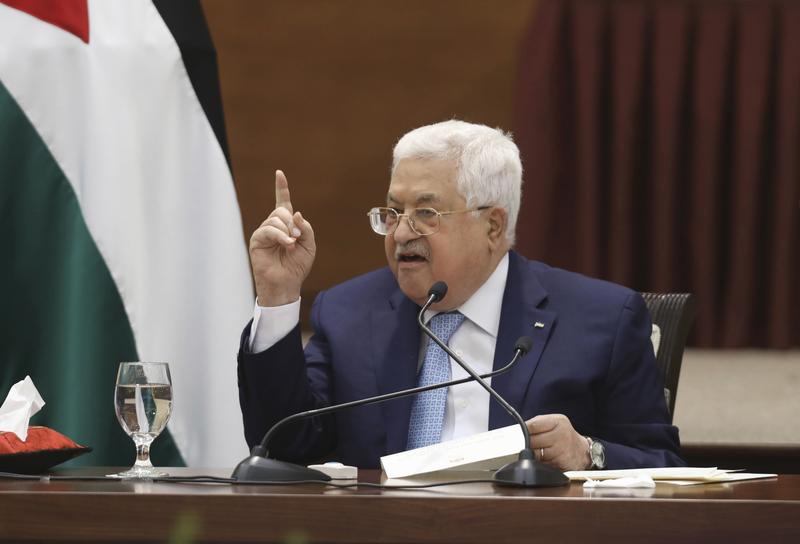 Palestinian President Mahmoud Abbas heads a leadership meeting at his headquarters in the West Bank city of Ramallah, May 19, 2020. (ALAA BADARNEH / POOL PHOTO VIA AP)
Palestinian President Mahmoud Abbas heads a leadership meeting at his headquarters in the West Bank city of Ramallah, May 19, 2020. (ALAA BADARNEH / POOL PHOTO VIA AP)
RAMALLAH - Despite Palestinian President Mahmoud Abbas' declaration to end all agreements with Israel, analysts believe that a total stop of security cooperation between the two sides is still ruled out, amid fears of a comprehensive confrontation.
Besides the exchange of security data between the two sides, the Palestinian Authority is still in need of being in touch with Israel to coordinate the daily affairs of the Palestinians as Israel controls all the West Bank crossing points
Abbas made his declaration on Tuesday in response to an Israeli plan of annexing large areas in the West Bank, which is supported by the United States. Several months ago, Abbas had also rejected US President Donald Trump's peace plan, so-called "The Deal of the Century."
Analysts believe that Abbas has not completely closed the door, where security cooperation with Israel still goes on in the current time.
The Israeli government didn't officially respond to the declaration of Abbas, but Israeli media outlets said that the Palestinian security forces may lower the volume of dealing with its Israeli counterparts.
Analysts also see that a comprehensive confrontation "will inevitably result from ending security coordination, which represents the most significant joints in the Israeli-Palestinian relationship."
ALSO READ: UN chief sets meeting with Abbas over Palestinian cause
Ahmad Rafiq Awad, a political analyst from Ramallah, told Xinhua that Abbas "kept these doors partially open for serious negotiations with new guarantees and new basics."
He clarified that ending all the agreements with Israel will put Israel in a dilemma of bearing the responsibility of governing the Palestinian territories.
"If security cooperation between the two sides stops, the coming period may witness popular confrontations, even a new violent Palestinian uprising against Israel," he said.
 The Dome of the Rock mosque stands in the Old City of Jerusalem in a general view taken from the Mount of Olives on Dec 6, 2019. (EMMANUEL DUNAND / AFP)
The Dome of the Rock mosque stands in the Old City of Jerusalem in a general view taken from the Mount of Olives on Dec 6, 2019. (EMMANUEL DUNAND / AFP)
Security cooperation is the most significant understanding in the Oslo agreement, according to which the Palestinian National Authority was established.
George Jaqman, Director of the Ramallah-based Institute for Democratic Studies, told Xinhua that ending Oslo agreement and stopping security cooperation "remains the minimum scenarios the Palestinian Authority has besides its attempts to keep urging the international community against Israel."
"Abbas may believe that the two sides can reach one day a peace agreement because he strongly believes that Israel is not interested in seeing the Palestinian Authority collapsing," Jaqman said.
He thought Abbas can't stop security cooperation with Israel, "because that would mean ending the Palestinian Authority security and economic presence in the West Bank."
Moreover, those who are still in favor of security cooperation and keeping the Palestinian commitments towards the Oslo agreement believe that stopping it unilaterally will pave the way for Israel to hold the Palestinians responsible for the ongoing conflict and preventing the possibility of reaching a peace agreement.
READ MORE: Abbas rejects US Mideast peace plan at UN meeting
Besides the exchange of security data between the two sides, the Palestinian Authority is still in need of being in touch with Israel to coordinate the daily affairs of the Palestinians as Israel controls all the West Bank crossing points.
Hani al-Masri, director of Masarat Center for Researches and Studies in Ramallah, told Xinhua that the Palestinian Authority will lose the justification for its presence in case Israel implements its annexation plan.
"The Palestinians are standing currently in front of hard choices and they require new strategies," said al-Masri.


